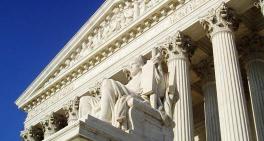Cornell Law Review
Law Reviews
For 100 years, the Cornell Law Review has earned a reputation as one of the nation’s leading law journals by publishing significant and challenging contributions to the world of legal scholarship. From its inception in 1915 through 1966, the Cornell Law Review published four issues annually and was known as the Cornell Law Quarterly. Six Student Editors were joined by one Faculty Editor, a Business Manager, and an Assistant Business Manager. In the first issue of the Cornell Law Quarterly in November 1915, Cornell professor (and soon-to-be Dean), Edwin Hamlin Woodruff, defended the launch of this new journal from critics who decried the proliferation of legal periodicals at the time (one contemporary critic counted twenty journals total—including non-scholarly periodicals).
Woodruff argued that the Cornell Law Quarterly would “justify its existence if it can reach and be helpful to . . . lawyers who might otherwise give their attention exclusively to the routine of practice” and noted the “pedagogical value . . . within the college itself” for the students who worked on the journal. Woodruff wrote that the journal “would not fail of its purpose, if it substantially enhances the spirit of mutual service between the College of Law and Cornell Lawyers; if it aides in some degree to foster any needed reform in the law, or to give help by intelligent discussion and investigation toward the solution of legal problems; and if it satisfies within the college itself among the students and faculty a desire to advance . . . the cause of legal education in a larger sense.”
From its inception, the journal fulfilled this vision by producing groundbreaking legal scholarship that was at the same time useful to practitioners. The first article in the first issue of the Cornell Law Quarterly was authored by Cornell University President Jacob Gould Schurman, who had recently completed his term as Vice President of the New York State Constitutional Convention of 1915. Schurman, and other authors in that issue and later issues of the Cornell Law Quarterly, chronicled the recent constitutional convention to illuminate the provisions of the state’s new Constitution. The journal also realized Woodruff’s vision by honing the legal skills of the student editors who served on the journal. One of the first Editors-in-Chief of the Cornell Law Quarterly, Elbert Tuttle, later rose to prominence as the Chief Judge on the Fifth Circuit Court of Appeals during a time when that court was called upon to be the primary enforcer of the Supreme Court’s decision in Brown v. Board of Education in the southern states in that circuit.
The journal grew steadily over the next fifty years, expanding to the point at which a staff of thirty-four students undertook a two-stage expansion of the journal’s publishing schedule. In 1966, the Cornell Law Quarterly published six issues—Fall, Winter I, Winter II, Spring I, Spring II, and Summer. In 1967, it committed itself to a bi-monthly publishing schedule and changed its name to the Cornell Law Review. Today, the Cornell Law Review is edited exclusively by upper class students in Cornell Law School’s Juris Doctor (J.D.) program.
The Cornell Law Review/Law Quarterly has regularly published contributions from the nation’s leading scholars in legal education. Justices of the Supreme Court have also taken to the pages of the journal to express their views—whether it was Robert Jackson, John Harlan, William Douglas, or Felix Frankfurter in the pages of the Cornell Law Quarterly, or Ruth Bader Ginsburg more recently in the Cornell Law Review. The journal has also drawn on the strength and excellence of the Cornell Law School faculty—publishing contributions by Professor Kevin Clermont on jurisdictional questions, Professor Theodore Eisenberg’s empirical work, Professor James Henderson (co-Reporter on the Third Restatement of Torts) on products liability, and Professor Steven Shiffrin on the religion clauses of the First Amendment. The journal has also featured the work of some new additions to the Cornell faculty—Professors Mitchel Lasser, Trevor Morrison, and Bradley Wendel in recent volumes.
Related listings
-
Columbia Law Review
Law Reviews 01/23/2017The Columbia Law Review is one of the world’s leading publications of legal scholarship. Founded in 1901, the Review is an independent nonprofit corporation that produces a law journal edited and published entirely by students at Columbia Law S...
-
Trinity Law Review
Law Reviews 01/23/2017Trinity Law Review is a student-run journal that has published legal scholarship since our founding in 1980. Short of actually printing the journal onto paper, students run the entire process—including selecting articles for publication, editin...
-
California Western Law Review
Law Reviews 01/23/2017One of the most valuable learning experiences available to law students is being a member of their law school's law review. Both the California Western Law Review and the California Western International Law Journal are student run and publish schola...




